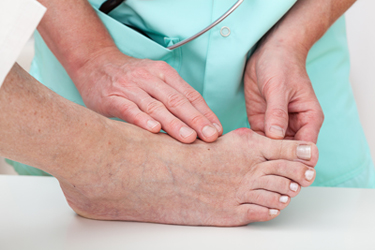
A bunion, termed hallux valgus, is a bone deformity of the big toe. This condition can cause the tip of the toe to push toward the smaller toes as the bottom of the toe joint juts outward from the foot. The resulting bump can prove to be painful as it changes the gait and rubs against the inside of the shoe. In some cases, a surgical procedure may be the only option for reducing pain. This may be successful in straightening out the joint, in addition to stabilizing the gait. It can also help to prevent hammertoe and other foot abnormalities from developing. Deciding on bunion surgery depends on various factors, such as the severity of the bunion, and whether it is related to osteoarthritis. Additionally, the impact it may have on completing daily activities or participating in sporting activities may contribute to making this decision. Side effects may include nerve damage, inflammation, and permanent stiffness. It is beneficial to explore this with a podiatrist before deciding on this type of surgery. To find out whether bunion surgery is the right option for you, it is suggested that you consult a podiatrist for an exam and diagnosis.
If you are suffering from bunion pain, contact Dwayne A. Lay, DPM of Elite Foot and Ankle. Our doctor can provide the care you need to keep you pain-free and on your feet.
What Is a Bunion?
Bunions are painful bony bumps that usually develop on the inside of the foot at the joint of the big toe. As the deformity increases over time, it may become painful to walk and wear shoes. Women are more likely to exacerbate existing bunions since they often wear tight, narrow shoes that shift their toes together. Bunion pain can be relieved by wearing wider shoes with enough room for the toes.
Causes
- Genetics – some people inherit feet that are more prone to bunion development
- Inflammatory Conditions - rheumatoid arthritis and polio may cause bunion development
Symptoms
- Redness and inflammation
- Pain and tenderness
- Callus or corns on the bump
- Restricted motion in the big toe
In order to diagnose your bunion, your podiatrist may ask about your medical history, symptoms, and general health. Your doctor might also order an x-ray to take a closer look at your feet. Nonsurgical treatment options include orthotics, padding, icing, changes in footwear, and medication. If nonsurgical treatments don’t alleviate your bunion pain, surgery may be necessary.
If you have any questions, please feel free to contact our office located in Canton, GA . We offer the newest diagnostic and treatment technologies for all your foot care needs.